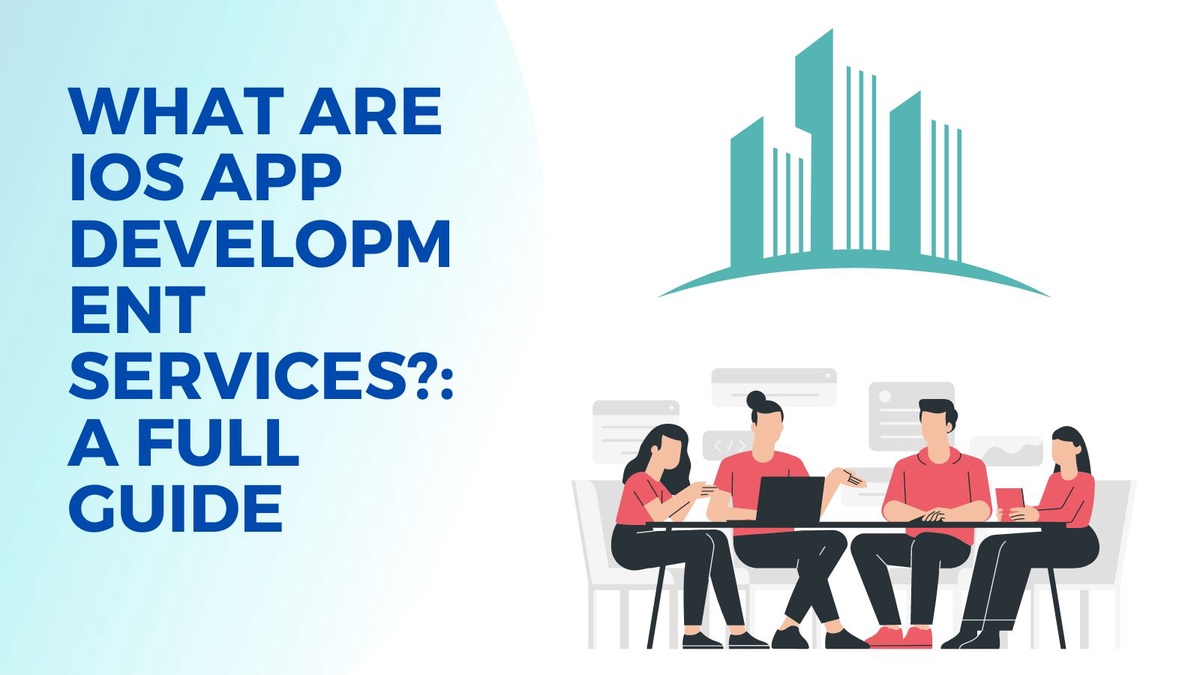What are iOS App Development Services?: A Full Guide
iOS app development services encompass the complete process of creating applications for Apple's iOS operating system, running on devices like iPhones and iPads. This comprehensive guide covers various stages in developing an iOS app.
iOS app development services refer to the process of creating software applications specifically designed to run on Apple's iOS operating system, which powers devices such as iPhones, iPads, and iPod Touch. These services encompass the entire lifecycle of app development, from conceptualization and design to coding, testing, deployment, and ongoing maintenance.
By following these steps, developers ensure a smooth and effective iOS app development process.
iOS App Development Services-
Here's a comprehensive guide to iOS app development services:

Conceptualization and Planning:
Conceptualization and planning are the initial phases in the development of an iOS app, laying the foundation for its success. During this stage, the purpose and goals of the app are defined, considering the needs of the target audience.
Market research is conducted to understand user preferences and assess competitors. The planning phase involves outlining the features and functionalities of the app, creating a roadmap for its development. This is the stage where key decisions are made regarding the app's design, user experience, and overall vision.
Design:
Design is a crucial phase in the iOS app development process, focusing on creating an engaging and user-friendly interface. During this stage, developers transform the conceptualized ideas into visual representations.
Wireframes and prototypes are crafted to map out the app's structure and flow. The user interface (UI) and user experience (UX) are meticulously designed, considering factors like ease of use, visual appeal, and brand consistency.
This involves selecting appropriate color schemes, fonts, and graphics to enhance the overall look and feel. A well-executed design ensures that users can navigate the app intuitively, fostering a positive and enjoyable experience.
Development:
Development is a pivotal stage in iOS app creation, where the conceptualized design comes to life through coding and programming. Skilled developers use programming languages like Swift or Objective-C to write the code that forms the backbone of the application.
The development process involves translating the planned features and functionalities into functional elements within the app. Apple's integrated development environment (IDE) called Xcode is commonly used for coding, testing, and debugging.
This stage demands precision and attention to detail to ensure that the app functions as intended. Developers also create the necessary backend infrastructure if the app requires server-side components.
Testing:
Deployment:
The process involves submitting the app to the Apple App Store for review and approval. Apple's review process ensures that the app complies with guidelines, is free of bugs, and adheres to security standards.
Once the app receives approval, it becomes accessible to users for download and installation. Deployment is a significant milestone, as it makes the app widely available to the target audience.
Regular updates and enhancements are common post-deployment practices, ensuring that the app remains relevant, secure, and aligned with evolving user needs

Post-launch Support and Maintenance:
Post-launch support and maintenance are crucial aspects of iOS app development, focusing on ensuring the continued functionality, performance, and user satisfaction after the app is deployed. This phase involves actively monitoring user feedback, addressing any reported issues, and providing ongoing assistance to users.
Developers must be responsive to user inquiries, bug reports, and feature requests. Regular updates are released to introduce new features, improvements, and bug fixes. Compatibility with the latest iOS updates and devices is maintained to guarantee a seamless user experience.
Post-launch support also involves implementing security measures to protect user data and privacy. The goal is to create a positive and reliable user experience, fostering user loyalty and positive reviews.
Integration of Advanced Features:
The integration of advanced features is a pivotal phase in iOS app development, involving the incorporation of cutting-edge technologies to enhance the app's functionality and user experience. This phase often includes the integration of advanced capabilities such as augmented reality (AR), machine learning, and artificial intelligence (AI).
Ensuring compatibility with the latest iOS features and guidelines is essential during this phase. Developers need to stay abreast of technological advancements to incorporate innovative features that align with user expectations and industry trends. The integration of advanced features not only enhances the app's capabilities but also positions it as a forward-thinking and competitive offering in the ever-evolving landscape of mobile applications.
Security:
Security is a paramount consideration in iOS app development, focusing on safeguarding user data and ensuring the protection of sensitive information. Developers employ robust security measures to mitigate potential threats and vulnerabilities throughout the app's lifecycle.
Encryption techniques are often used to secure data transmission and storage, ensuring that user information remains confidential. Secure authentication methods, such as biometrics or strong passwords, are implemented to prevent unauthorized access.
A strong focus on security not only protects users but also enhances the app's reputation, instilling trust among users who rely on the application to handle their sensitive information. As the threat landscape evolves, developers must remain vigilant, implementing the latest security measures to stay one step ahead of potential risks.

Scalability:
Scalability involves optimizing the app's performance to maintain responsiveness even as the number of users and data transactions increases. This includes considerations for server infrastructure, database architecture, and other backend components.
The goal is to prevent performance bottlenecks and downtimes, ensuring a smooth user experience regardless of the app's popularity.
By prioritizing scalability, developers lay the foundation for the app's long-term success, allowing it to evolve and handle increased demands without compromising performance or user satisfaction. This proactive approach ensures that the app can grow and adapt in tandem with the changing needs of its user base.
Cost and Timeline Management:
Cost and timeline management are critical aspects of iOS app development, ensuring that the project stays within budget constraints and meets predefined deadlines. Estimating development costs and timelines accurately requires careful planning and consideration of various factors.


No comments yet